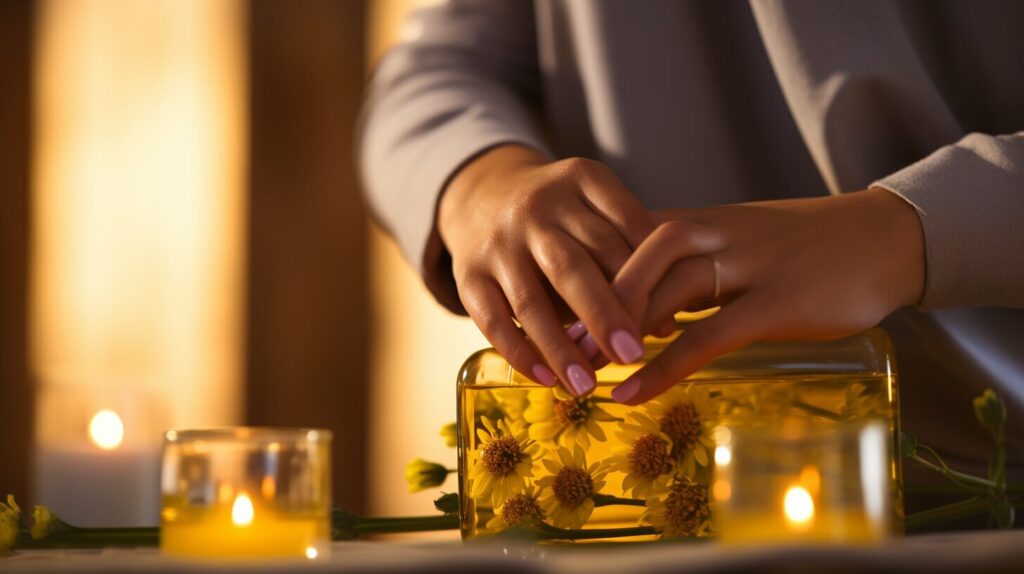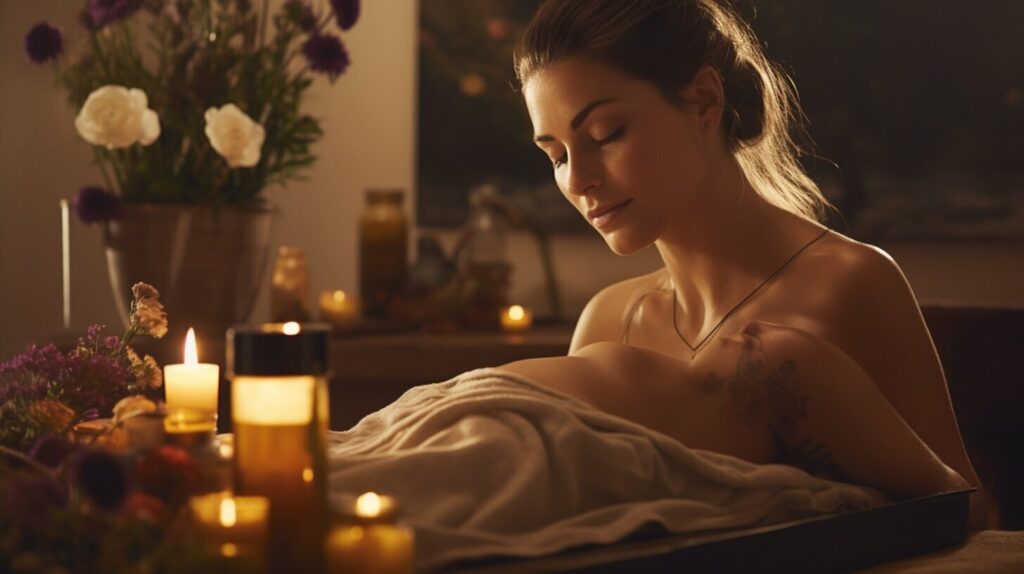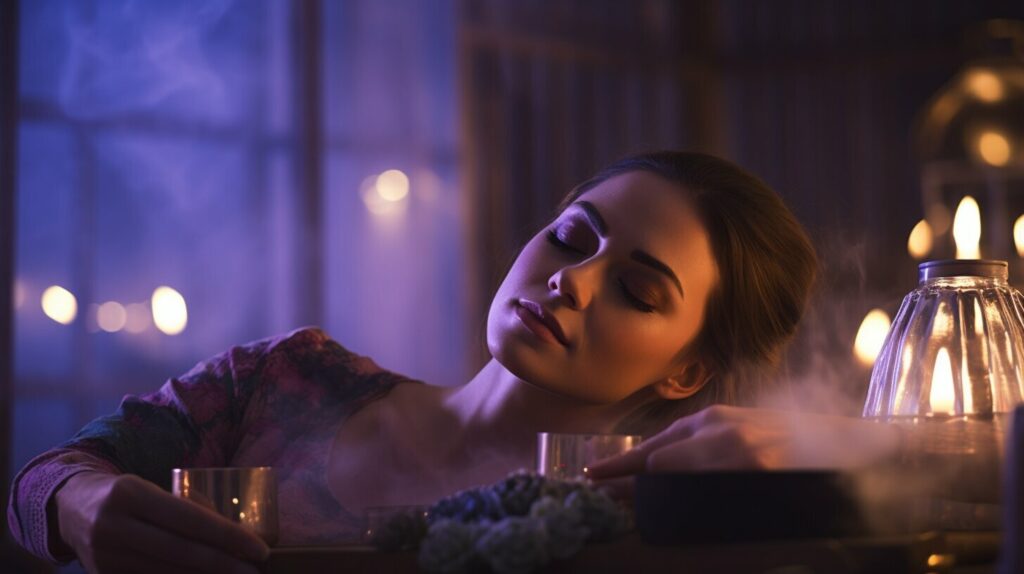Welcome to the world of aromatherapy massage, where the soothing scents of essential oils and the expert touch of a skilled therapist combine to create a truly transformative spa experience. Whether you’re seeking relaxation, stress relief, or overall wellness, aromatherapy massage offers a holistic approach to healing and rejuvenation.
At its core, aromatherapy massage harnesses the therapeutic benefits of aromatic scents and combines them with the healing power of touch. Through the skillful application of essential oils and massage techniques, this practice can enhance your physical and emotional well-being, leaving you feeling refreshed and revitalized.
Key Takeaways:
- Aromatherapy massage combines essential oils and massage techniques for a truly rejuvenating spa experience.
- It can provide relaxation, stress relief, and overall wellness.
- Aromatherapy massage harnesses the therapeutic benefits of aromatic scents.
- It promotes physical and emotional well-being through the healing power of touch.
- Experience the rejuvenating benefits of aromatherapy massage and indulge in a truly transformative spa experience.
What is Aromatherapy?
Aromatherapy, also known as essential oil therapy, is a holistic healing treatment that utilizes natural plant extracts to promote well-being. These plant extracts, called essential oils, are derived from the petals, stems, and roots of plants and capture the unique scents and medicinal properties of the plant.
Essential oils have been used for centuries by ancient civilizations, such as the Egyptians and the Chinese, for their therapeutic benefits. Aromatherapy is a popular practice today and is used to improve physical and mental health.

How Does Aromatherapy Work?
Aromatherapy works by safely absorbing essential oils into the body. These oils can be applied topically through massage or absorbed through scents.
There are various methods of aromatherapy, including using diffusers, spritzers, bath salts, body masks, and compresses. Each method allows the essential oils to be absorbed into the body, providing therapeutic benefits.
Aromatherapy can help alleviate specific conditions and promote relaxation and well-being. The choice of essential oil depends on the individual’s needs and the desired effects.
Section 3: How Does Aromatherapy Work?
Aromatherapy works by safely absorbing essential oils into the body. These oils can be applied topically through massage or absorbed through scents. There are various methods of incorporating aromatherapy into your wellness routine, such as diffusers, aromatic spritzers, bath salts, body masks, and hot or cold compresses.
When applied topically, essential oils are mixed with carrier oils, such as almond or jojoba oil, and massaged onto the skin. This allows the oils to be absorbed into the bloodstream and reach their therapeutic targets. Different oils have different properties, so a trained aromatherapist can recommend the most appropriate oil for your specific needs.
To enjoy the aromatic benefits of essential oils, you can use a diffuser to disperse the scent into the air. This allows you to inhale the oils, which then interact with your olfactory system and provide various therapeutic effects. Aromatic spritzers can also be used to spray the oils onto your body or around your living space for a refreshing burst of scent.
In addition, incorporating aromatherapy into your bathing routine can be incredibly soothing. Adding a few drops of your chosen essential oil to your bathwater or using bath salts infused with essential oils can create a relaxing and fragrant experience. Similarly, applying a body mask made with essential oils can nourish your skin while delivering the therapeutic benefits of the oils.
Using Hot or Cold Compresses
Hot or cold compresses can be a useful way to apply essential oils topically to specific areas of the body. To make a hot compress, soak a cloth in hot water, wring out the excess, and then add a few drops of your chosen oil. Place the compress on the desired area and relax as the oil is absorbed into your skin.
A cold compress can be made by soaking a cloth in cold water and adding a few drops of essential oil. Apply the compress to the desired area to provide a cooling sensation and deliver the benefits of the oil to the skin.
| Method | Description |
|---|---|
| Topical Application | Essential oils are mixed with carrier oils and applied directly to the skin, allowing for absorption into the bloodstream. |
| Diffusers | Essential oils are dispersed into the air, allowing for inhalation and interaction with the olfactory system. |
| Aromatic Spritzers | Oils are sprayed onto the body or in living spaces to provide a refreshing burst of scent. |
| Bath Salts and Body Masks | Essential oils are added to bathwater or incorporated into body masks for a relaxing and nourishing experience. |
| Hot or Cold Compresses | Essential oils are applied topically using hot or cold compresses to deliver targeted relief. |
With these various methods, aromatherapy allows the therapeutic benefits of essential oils to be absorbed into the body, promoting relaxation, well-being, and overall holistic healing.

Origins and History of Aromatherapy
Aromatherapy, as we know it today, has a rich history that can be traced back to ancient civilizations and cultures. Its origins lie in the practices and knowledge of various ancient societies, including those in China and Egypt.
Ancient Civilizations
Ancient civilizations, particularly in China, recognized the healing properties of plants and utilized them in their medicinal practices. These early practitioners experimented with different plants and developed distillation techniques to extract essential oils.
Distillation Techniques and the Ancient Egyptians
The ancient Egyptians took the use of essential oils further and incorporated them into their embalming rituals. They believed that these oils possessed not only healing properties but also spiritual significance.
“The ancient Egyptians believed that essential oils held the power to connect the physical and spiritual realms.”
French Chemist’s Contribution
Aromatherapy, as we know it today, owes much to the work of a French chemist named Rene-Maurice Gattefosse. In 1937, Gattefosse coined the term “aromatherapy” and extensively researched the therapeutic benefits of essential oils.
Aromatherapy in World War II
The recognition of aromatherapy grew during World War II when essential oils were used to treat injured soldiers. The antiseptic and healing properties of certain oils proved invaluable in healing wounds and preventing infections.
The history of aromatherapy is a testimony to the wisdom of ancient civilizations and the ongoing scientific exploration of natural remedies. Today, aromatherapy continues to evolve and find new applications in promoting health and well-being.
Popular Essential Oils for Aromatherapy Massage
When it comes to aromatherapy massage, the choice of essential oils plays a vital role in enhancing the overall experience. Each essential oil has its unique scent and therapeutic properties, providing distinct benefits to promote relaxation, rejuvenation, and well-being. Here are some popular essential oils used in aromatherapy massage:
- Eucalyptus: Known for its refreshing and invigorating scent, eucalyptus oil is commonly used to relieve respiratory issues and promote a sense of clarity.
- Lemongrass: With its uplifting and citrusy aroma, lemongrass oil is often used to reduce stress, relieve muscle pain, and improve digestion.
- Lavender: Widely regarded for its calming and soothing properties, lavender oil helps to promote relaxation, reduce anxiety, and improve sleep quality.
- Neroli: Derived from the blossoms of bitter orange trees, neroli oil is cherished for its sweet and floral scent, known to alleviate stress and anxiety.
- Lemon: The vibrant and refreshing aroma of lemon oil is commonly used to enhance mood, boost energy, and stimulate mental clarity.
- Tea Tree: Recognized for its powerful antibacterial and antifungal properties, tea tree oil is often used to treat skin infections, soothe inflammation, and promote healthy skin.
- Vetiver: With its earthy and grounding aroma, vetiver oil is known for its calming effects, helping to reduce stress, anxiety, and promote relaxation.
- Rose: Renowned for its romantic scent, rose oil is often used to uplift mood, reduce stress, and promote feelings of love and well-being.
- Ylang-Ylang: With its exotic and floral fragrance, ylang-ylang oil is commonly used to reduce anxiety, promote relaxation, and enhance libido.
Aromatherapy Massage: A Blend of Soothing Scents and Therapeutic Touch
During an aromatherapy massage session, the therapist carefully selects the essential oils based on the individual’s needs and preferences. The chosen oils are then blended with a carrier oil and applied to the body through gentle massage strokes. As the oils are absorbed into the skin, their healing properties are transferred to the body, providing a holistic and rejuvenating experience.
It’s important to note that aromatherapy massage should only be performed by trained professionals who understand the appropriate dilution ratios and safety precautions associated with essential oils. The therapist will tailor the massage to address specific concerns while ensuring a relaxing and enjoyable experience.

Choosing the Right Essential Oil for Your Aromatherapy Massage
When considering aromatherapy massage, it’s essential to choose the right essential oil that aligns with your desired benefits. Whether you seek stress relief, relaxation, or a boost in mood, consulting with a trained aromatherapist can help guide you towards the ideal essential oil for your massage.
The power of aromatherapy lies in the therapeutic scents and properties of the essential oils, working in harmony with the massage techniques to create a truly holistic and rejuvenating experience. Soothe your senses, relax your body, and elevate your well-being with the healing benefits of aromatherapy massage.
Healing Benefits of Aromatherapy Massage
Aromatherapy massage offers a wide range of healing benefits, making it a popular choice for those seeking relief from various health concerns. Whether you’re dealing with headaches, sore throats, inflammation, menstrual cramps, stress, anxiety, depression, sleep disorders, or respiratory problems, aromatherapy massage can provide a natural and holistic solution.
One of the key advantages of aromatherapy massage is its ability to target specific issues. By using essential oils known for their therapeutic properties, such as lavender for headaches or eucalyptus for respiratory problems, the massage can effectively alleviate symptoms and promote healing.
The soothing touch of the massage therapist combined with the aromatic scents of the essential oils creates a deeply relaxing experience. This relaxation can help reduce stress levels, relieve anxiety and depression, and improve overall well-being. In addition, aromatherapy massage can also enhance sleep quality, which is crucial for optimal health and rejuvenation.
Research has shown that aromatherapy massage can have a positive impact on both physical and mental health. It can help reduce inflammation, ease pain, and improve circulation. Furthermore, the combination of massage techniques and essential oils can stimulate the release of endorphins, the body’s natural painkillers, providing natural pain relief.

In summary, aromatherapy massage offers a gentle yet powerful approach to healing. By harnessing the therapeutic benefits of essential oils and the healing touch of massage, it can effectively address a wide range of health concerns. Whether you’re seeking relief from headaches, stress, or respiratory problems, aromatherapy massage can provide a holistic solution for improved well-being.
Section 7: How Aromatherapy Massage Promotes Relaxation and Well-being
The art of aromatherapy massage offers a holistic approach to promoting relaxation, reducing stress, and enhancing overall well-being. By combining the therapeutic properties of essential oils with soothing massage techniques, aromatherapy massage provides a deeply rejuvenating experience for both the body and mind.
Aromatherapy massage can have a profound effect on stress reduction. The gentle kneading and rhythmic motions of the massage help to relax tense muscles, release built-up tension, and promote a sense of calm. The aromatic scents of the essential oils further aid in relaxation, as certain scents have been found to have a direct impact on the brain, triggering the release of feel-good chemicals that enhance mood and reduce anxiety.
Another significant benefit of aromatherapy massage is its ability to improve sleep quality. The combination of soothing massage strokes and the inhalation of calming essential oils can help calm the mind and prepare the body for a restful night’s sleep. Studies have shown that certain essential oils, such as lavender and chamomile, have sedative properties and can promote a deeper, more rejuvenating sleep.
Furthermore, aromatherapy massage can provide effective pain relief. The essential oils used in the massage, when absorbed into the body, can penetrate deep into the tissues, helping to alleviate inflammation and reduce discomfort. Aromatherapy massage is particularly beneficial for those suffering from muscle aches, joint pain, and headaches.

To summarize, aromatherapy massage offers a multi-faceted approach to relaxation, stress reduction, improved sleep, pain relief, and enhanced mood. The combination of massage techniques and the therapeutic benefits of essential oils provides a deeply soothing experience for both the body and mind. If you’re looking for a natural and holistic way to promote overall well-being, aromatherapy massage is a powerful tool to consider.
Conclusion
Aromatherapy massage is a holistic healing practice that offers a multitude of beneficial effects for your overall health and well-being. By combining the therapeutic properties of essential oils with the techniques of massage therapy, this treatment promotes relaxation, reduces stress, relieves pain, and improves your sleep quality.
Through the power of aromatherapy massage, you can experience the wonders of holistic healing. The soothing scents and touch of the massage therapist work together to provide deep tissue penetration, allowing the essential oils to work their magic on your body and mind. The result? A truly rejuvenating and relaxing experience.
Not only does aromatherapy massage offer effective stress reduction and pain relief, but it also contributes to improved overall health. By incorporating this practice into your wellness routine, you can achieve a state of deep relaxation, enjoy quality sleep, and enhance your physical and emotional well-being.
So, if you’re looking for a natural and effective way to promote relaxation and holistic healing, give aromatherapy massage a try. Experience the transformative power of this ancient practice and unlock a world of wellness, where you can truly unwind, rejuvenate, and boost your overall health.
FAQ
What is aromatherapy?
Aromatherapy is a holistic healing treatment that uses natural plant extracts, or essential oils, to enhance health and well-being.
How does aromatherapy work?
Aromatherapy works by safely absorbing essential oils into the body, either through topical application or by inhaling scents.
What are some popular essential oils used in aromatherapy massage?
Some popular essential oils used in aromatherapy massage include eucalyptus, lemongrass, lavender, neroli, lemon, and tea tree.
What are the therapeutic benefits of aromatherapy massage?
Aromatherapy massage can help alleviate a range of health concerns, including headaches, sore throats, inflammation, menstrual cramps, stress, anxiety, depression, sleep disorders, and respiratory problems.
How does aromatherapy massage promote relaxation and well-being?
Aromatherapy massage promotes relaxation and well-being through the combination of massage techniques and the therapeutic properties of essential oils. The massage helps reduce stress, improve sleep, relieve pain, and enhance mood.
